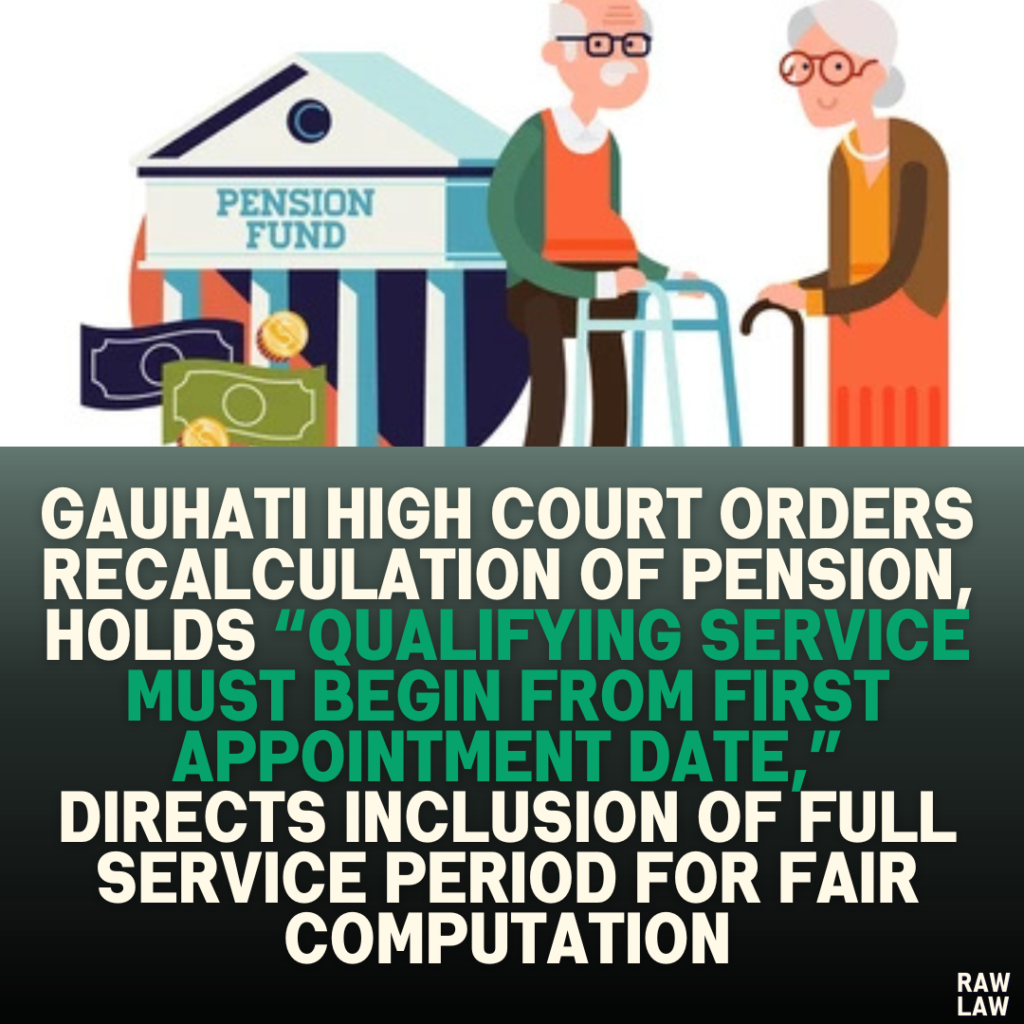Court’s Decision:
The Gauhati High Court ruled that the pension benefits of the petitioner’s husband must be recalculated by considering his total service period from April 28, 1961, to April 30, 2000. The court declared the earlier calculation, based on only 24 years and 11 months of service, incorrect and violative of judicial precedent. The respondents were directed to issue a revised Pension Payment Order (PPO) within three months. Failure to comply would result in the amount becoming due with 6% annual interest.
Facts:
- The petitioner’s husband joined the Panchayat service on April 28, 1961, and retired on April 30, 2000, after approximately 39 years of service.
- His service was provincialized (recognized under government norms) on October 1, 1991, under the Assam Panchayat Employees (Provincialization) Act, 1999.
- Despite nearly 39 years of service, the pension was calculated based on 24 years and 11 months, starting only from the provincialization date and ignoring earlier service.
- A Pension Payment Order (PPO) was issued based on this calculation, leading to a reduced pension for both the petitioner’s husband during his lifetime and the family pension received by the petitioner after his demise.
Issues:
- Should the pension calculation include the period before provincialization of service?
- Did the respondent authorities violate judicial precedent by restricting the service period used for calculating pension benefits?
Petitioner’s Arguments:
- The petitioner contended that the entire service period from the date of initial appointment (April 28, 1961) to the retirement date (April 30, 2000) must be considered, as mandated by the Assam Panchayat Employees Act, 1999.
- The calculation, as per the Pension Payment Order, violated the judgment in State of Assam & Anr. v. Syed Md. Fazlay Rabbi. In this case, it was held that pension computation for provincialized employees must include the period of service from their initial appointment.
Respondent’s Arguments:
- The respondents justified their calculation, arguing that only the service rendered against a sanctioned post after provincialization (i.e., after October 1, 1991) could be considered for pension computation.
- They claimed compliance with the Assam Panchayat Employees Act, 1999, which, in their view, limited reckonable service to employment under provincialized terms.
Analysis of the Law:
- The Assam Panchayat Employees (Provincialization) Act, 1999, includes:
- Section 2(d): Defines an “employee” as one serving against a regular sanctioned post.
- Section 2(b): Defines the “date of appointment” as the initial date of joining service.
- Judicial interpretation in Syed Md. Fazlay Rabbi clarified that “date of appointment” signifies continuity of service from the first appointment, even before provincialization.
- The court emphasized that pension and retirement benefits are linked to the total duration of service and provincialization cannot nullify prior service.
Precedent Analysis:
- In State of Assam & Anr. v. Syed Md. Fazlay Rabbi:
- The Gauhati High Court Division Bench ruled that pension and retirement benefits must be computed based on the entire service tenure, starting from the initial date of appointment.
- The court specifically held that the date of provincialization is merely a legislative milestone and not the start of reckonable service for pension.
- The judgment was upheld by the Supreme Court, solidifying the principle.
- The petitioner relied on this precedent, asserting that her husband’s qualifying service must start from 1961.
Court’s Reasoning:
- The High Court concluded that the qualifying service must be reckoned from April 28, 1961, the date when the petitioner’s husband joined service, and not from October 1, 1991 (provincialization date).
- The court emphasized that the respondent authorities’ method of calculation contravened the principles established in Syed Md. Fazlay Rabbi and subsequent notifications by the Pension and Public Grievance Department.
- The respondent’s interpretation of the Assam Panchayat Employees Act, 1999, was rejected as inconsistent with the statutory provisions and judicial precedents.
Conclusion:
- The High Court held that the petitioner’s husband’s qualifying service spans 39 years, from April 28, 1961, to April 30, 2000.
- The court directed the respondent authorities to:
- Recalculate the pension and pensionary benefits.
- Issue a revised PPO to the petitioner within three months.
- Release all arrears, including amounts due to the petitioner’s husband during his lifetime.
- The court imposed a 6% annual interest on the amount due if the revised PPO is not issued within the prescribed period.
Implications:
- This judgment reaffirms that provincialization does not truncate earlier service periods for pension computation.
- It underscores the importance of judicial precedents in protecting the rights of employees, particularly under the Assam Panchayat Employees Act, 1999.
- The decision ensures fair treatment of provincialized employees and could serve as a reference in similar disputes.



